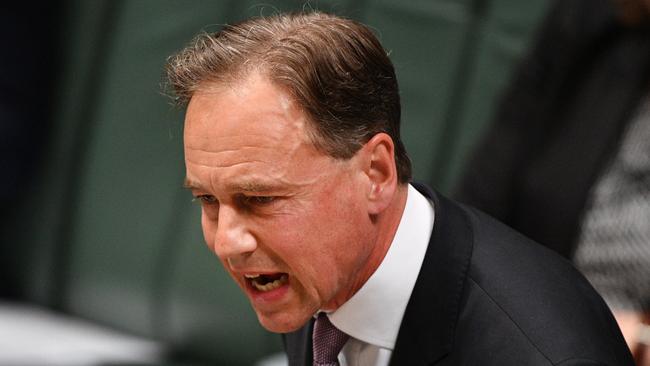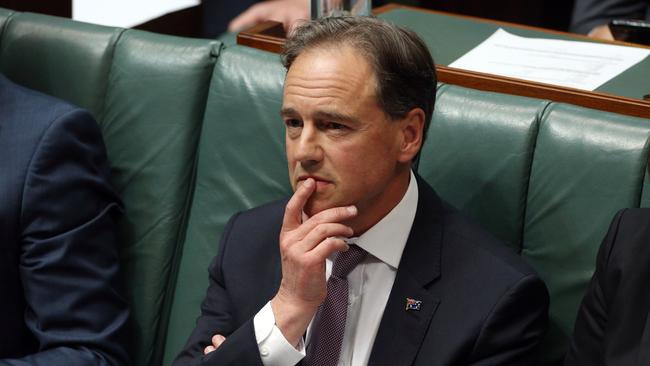The slow death of our health insurance system
Inaction, greed and government mismanagement is steadily strangling our precious universal healthcare system, and the result is consumers like me paying through the nose for less, writes Margaret Wenham.

Rendezview
Don't miss out on the headlines from Rendezview. Followed categories will be added to My News.
Attention, please, all those out there among the 44.9 per cent (and sliding) of Australians with private health insurance.
You should immediately call or fire off an email to your insurer asking what benefits may be axed from (or added to) your hospital or extras cover after April 1, and what the impact will be on your premium in dollar terms. (This is so you’ve got a fighting chance of working out whether the value for money of your policy has improved or not.) You should also ask about the size of this year’s annual premium hike — separate and apart from any premium changes associated with your benefits being reformed.
I’ll wager a lot of us will be hit with increases higher than the 3.25 per cent touted last month by Minster for Health Fund Profits, Greg Hunt.
MORE FROM MARGARET WENHAM: No wonder people are dumping health insurance. It’s out of control
The thing is, April 1 is when the Coalition Government’s much vaunted, flagship “more affordable” private health insurance reforms come into effect, notably including the new “simplified” Gold, Silver, Bronze, and Basic product tiers.
Is it mere coincidence that these reforms activate from April Fools’ Day?
Actually, I’ve just had second thoughts about encouraging you to take this action because having gone to that effort you might find yourself fobbed off, like I was when I emailed Bupa two weeks ago.
I asked: “When is Bupa intending to adopt this Gold/Silver/Bronze/Basic scheme), what tier will my current ‘top hospital’ cover convert to and how (by how much) will this affect my premium?”

A reasonable inquiry with the reforms less than three months away, I thought. But … “Thank you for contacting us in regards to the impacts of the upcoming changes,” replied Rohan from the chirpy Bupa team.
“While we don’t have any updates on the impacts of the reforms as yet, we will ensure to provide you with written notice of what these changes will mean for you once they’re known.” I’ve heard nothing since.
But, as our national health reporter Sue Dunlevy revealed last week, some funds have already begun “axing benefits … just weeks after announcing they would raise premiums by almost twice the inflation rate.
MORE FROM MARGARET WENHAM: Greedy doctors will force price regulation
“Up to half of all policy holders are receiving letters explaining their entitlements have changed … Some members will find themselves paying higher premiums which deliver less benefits,” Dunlevy reported, adding Medibank had “emailed members with mid-range corporate hospital products to warn they will axe benefits for 70 treatments including some weight loss and fertility treatments”.
Benefits for another 64 in-hospital Psychiatry or Psychotherapy services would also be affected, as would extras cover, from which 10 natural therapies would be cut.
No date for the Medibank changes was given.
Bupa didn’t give a date either but admitted to “detrimental changes for some of our customers” while saying some would benefit from new items.
NIB, also making cuts, said its changes would apply from July 1.

The other thing you can do is hop on the Department of Health’s site and check out what Hunt’s minions say will be included in the four levels of cover.
But, oh wait, I’ve just had second thoughts about that too because I’ve tried comparing the items listed on my Bupa “top hospital” cover with the Department’s list of Gold treatments and had to give up because it’s like comparing apples with oranges or, more likely, appendicitis with oral submucous fibrosis.
Coalition MPs must be sweating on these reforms — which include lifting permissible excesses so, for example, a family can pay a $1500 excess in exchange for a lower premium (who would want to pay that sort of excess, I wonder?), and giving people under 30 premium discounts of up to 10 per cent, to be phased out after they turn 41 (how’s that being paid for, I wonder?) — producing more affordable health services without (a) a big chunk of older policy holders getting another financial shafting; and (b) destroying the whole system’s community rating and risk equalisation.
MORE FROM MARGARET WENHAM: Private health cover has become a mess and a joke
What’s still not being meaningfully tackled is the issue of out-of-pocket costs which is what really grinds everybody’s goat, particularly those of us paying the Medicare levy — 1.5 per cent of taxable income — plus top cover health insurance, the cost of which can be a huge burden for ordinary wage earners, self-funded retirees and pensioners. People like regular emailer Bill who tells me he and his wife’s premium is currently $5040 (!) and furiously says an inquiry is needed into the industry in toto — pharmaceutical costs, specialists on the take, private hospital charges, the lot.

While Hunt set up a flash-sounding Ministerial Advisory Committee on Out-of-Pocket Costs on January 2 last year, it is tasked with “developing the best way to make information about out-of-pocket costs more transparent to help consumers better understand these costs” and “make better choices”.
Well, just hand me that mirror and smoke machine, will you, because surely the aim of this “reform” should be to try to shrink or eliminate gap payments. It can’t be rocket science.
How about this. The Medicare Schedule, on which rebates are based, needs to be (regularly) updated so the fees for services and procedures are a fair reflection of modern day medical skills and technology, and business costs.
At the same time, the medical profession must address gouging by some medicos — perhaps by requiring all to publish their fees upfront with a comparison to the fee schedule while ramping up the message high fees bear no relationship to the quality of a medical practitioner.
And, finally, the Government needs to accept, as do we all, if what’s left of our universal system is to be protected, that the Medicare levy, stuck at 1.5 per cent for 24 years, needs to increase to help pay for the rebates associated with a fairer fee schedule.
There’s a lot riding on these reforms. Get it wrong and it’ll be one more reason for the voting public to deliver to the government a ballot box Bex along with a message to take a lie down for the next three years.
Margaret Wenham is the Courier-Mail’s opinion editor.
Originally published as The slow death of our health insurance system


